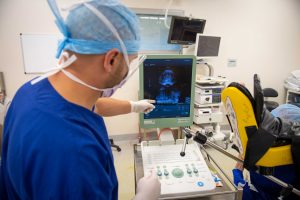What is an MRI fusion transperineal prostate biopsy?
MRI fusion transperineal prostate biopsy is a procedure that is performed for the purpose of accurately and comprehensively sampling the prostate tissue for cell changes that may be related to cancer or other conditions that affect the prostate gland.

Prostate biopsy is the only way to conclusively diagnose prostate cancer in men.
Who needs to have an MRI fusion transperineal prostate biopsy?
MRI fusion transperineal prostate biopsy is indicated for patients that:
- May have a nodule or some other type of abnormality on the prostate gland, that has been detected during a digital rectal examination
- Have an englarged prostate
- Have elevated PSA (prostate specific antigen) levels as indicated on their blood test.
Prostate biopsy is also sometimes performed in patients who have been diagnosed with prostate cancer previously, as part of their long term monitoring (Active Surveillance).
What are the benefits of having an MRI fusion transperineal prostate biopsy?
There are a number of advantages to having an MRI fusion transperineal prostate biopsy:
- It allows the urological surgeon to collect a large number of samples accurately and efficiently
- It enables the surgeon to visualize and sample the entire prostate gland, allowing for more effective detection of cell changes, including:
- Enabling the diagnosis of prostate cancer
- In cases where prostate cancer has been diagnosed, it allows the urologist to monitor for any changes over time
- Can be a useful tool for the diagnosis of other conditions that affect the prostate, such as:
- Benign prostatic hyperplasia/BPH/enlarged prostate
- Inflammation of the prostate – usually caused by infection
- Changes in prostate cell type, that is not cancer (PIN)
- There is no rectal bleeding, and significantly less risk of infection compared with transrectal (via the rectum) biopsy.
How is the MRI fusion transperineal prostate biopsy performed?
The specialist urological surgeons at Melbourne Urology Centre are highly experienced in performing MRI fusion transperineal prostate biopsy in Melbourne.
In order to be able to schedule the prostate biopsy procedure, the patient will have had to previously had an MRI scan of the prostate.
The MRI fusion prostate biopsy normally takes between 30-60 minutes to complete, and is usually performed under general anaesthesia.
The procedure is performed as follows:
- The ultrasound probe is inserted into the rectum, then using specialised technology, the live ultrasound image is fused with the patient’s existing MRI image
- A special biopsy grid is then positioned against the skin behind the testicles (perineum)
- The biopsy grid has holes that are 5mm apart, allowing the urological surgeon to collect biopsies from very specific areas of interest in the prostate gland.
What can patients expect after having an MRI fusion transperineal prostate biopsy?
Prior to scheduling your MRI fusion transperineal prostate biopsy, your urologist will take the time to explain the procedure in detail, answering any questions or concerns that you may have.
Generally:
- Most patients are able to go home on the same day following their prostate biopsy
- There may be some light bleeding in the perineal area, which is easily managed with gentle pressure – firm fitting underwear may help
- You may feel some discomfort in the area for a day or two following the prostate biopsy
- Some patients may notice a small amount of blood in their urine or ejaculate in the days following their prostate biopsy, however this usually goes away within a week or so
- In rare cases, the temporary inability to pass urine (urine retention) occurs; this can be fixed by temporary placement of a urinary catheter.
What are the expected procedure outcomes for an MRI fusion transperineal prostate biopsy?
A major benefit of the MRI fusion prostate biopsy is that the recovery time is very brief. Normal activities can be resumed usually within a couple of days.
The samples collected during the prostate biopsy are examined by a specialist pathologist, and the results are usually available for review by your urologist within a week.
MRI fusion transperineal prostate biopsy helps your urologist to accurately diagnose and differentiate between prostate cancer and other conditions that can affect the prostate. If required, the appropriate treatment can then be initiated for the patient’s individual condition.
MRI fusion transperineal prostate biopsy at Melbourne Urology Centre
Dr Shekib Shahbaz and Dr Tony de Sousa of Melbourne Urology Centre are highly experienced in performing MRI fusion transperineal prostate biopsy Melbourne.
If you would like more information on the procedure, or to book an appointment with one of our specialist urologists, please contact our rooms today on 1300 702 811.
